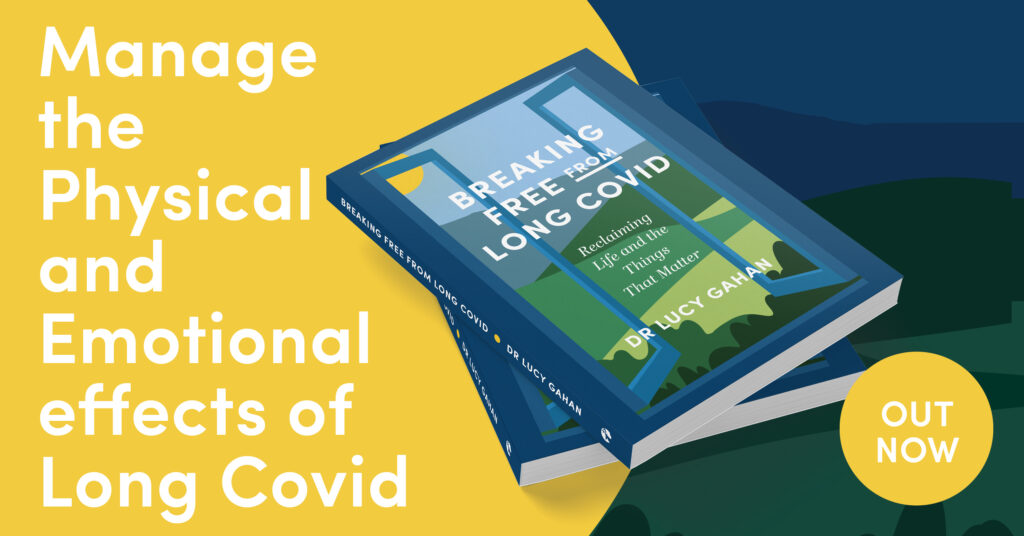
Dr Lucy Gahan, clinical psychologist and author of Breaking Free From Long Covid, delves into her lived experience, the importance of raising awareness for people with Long Covid, and the stigma they face.
“Covid only lasts two weeks.“
These were the words I heard in early summer of 2020, when I first turned up at A&E, desperate to know what was happening to my body. Two weeks earlier, I’d announced to my family that I’d had Covid and recovered. But the story didn’t unfold as it was supposed to. Instead of getting stronger, my body seemed to be overtaken by a cascade of terrifying symptoms that seemed to come out of nowhere, had no pattern, made no sense, and apparently didn’t show up on any medical tests. For several months I could barely stand up, as I developed POTS (Postural Orthostatic Tachycardia Syndrome), which is often triggered by a virus. This was the start, not only of Long Covid, but of the rollercoaster ride of having an illness whose symptoms are often invisible and seem to play tricks on you, and which medicine doesn’t understand and has little to offer. Long Covid has been likened to a game of snakes and ladders and can turn life as you know it, upside down.
Long Covid can be devastating, dismantling people’s health and lives. It is both physically and psychologically challenging in so many ways. People with Long Covid are also having to navigate prejudices that people with other illnesses, particularly those which are not well understood, have been having to deal with for decades while being largely ignored by Government and media.
For me, I was living a new version of my life that bore little resemblance to my old, pre-Covid life. My once strong, resilient body which I took for granted, was fragile and could no longer be relied upon to do even the most basic of things. When I did start to function a little better, if I did too much, physically or cognitively, it would cost me highly in terms of symptoms. Even those closest to me couldn’t quite fathom why I appeared almost normal from the outside, but would have to crawl back up into bed after trying to hang some washing. Perhaps I wasn’t trying hard enough. But I knew on the inside there was nothing wrong with my determination or resolve to get better, it was my body that was letting me down.
But it seemed I wasn’t alone. Stories of others suffering similar symptoms started to spread online. A shared and growing community of people who knew from the inside what it was like and were having to figure this out for themselves. I devoured any information that helped me to piece together what might be going on, or that helped my symptoms in any small way. I developed practices, small things which got me through the day and helped me feel just a little bit better. There were some things I could do, and actions I could take.
Ideas from my work as a Clinical Psychologist with people with serious illnesses were helping me to make some sense of why this felt so difficult, why I didn’t even feel like myself anymore, but a pared-down version of the old me. They were helping me to negotiate a way through the living losses of everything that illness takes away from you, the loss of life imagined. These ideas helped me to see that Long Covid isn’t the whole of me, that I could take some action, have some say in my own life and health, and still access the ‘me’ that I knew. If these ideas were helping me, maybe they would help someone else who was also lying in bed wondering what had happened to their body and their life. Or someone who is maybe where I am now, living somewhere between illness and wellness.
I hope that my book is helpful to those with Long Covid but also to people who may be trying to support someone with Long Covid, whether professionally or personally. In the words of Kaethe Weingarten (2001) “Illness or, more accurately, our relationship to it threatens the way we know ourselves and how others know us also. Anything that helps put illness in its place, that allows us to feel that we are who we are despite it, is welcome.”
Weingarten, K. (2001) ‘Making sense of illness narratives: Braiding theory, practice and the embodied life.’ Dulwich Centre Publications
Breaking Free From Long Covid by Dr Lucy Gahan is out now.
If you liked this article, why not join our mailing list to receive exclusive content and discounts? Sign up to the mailing list here.